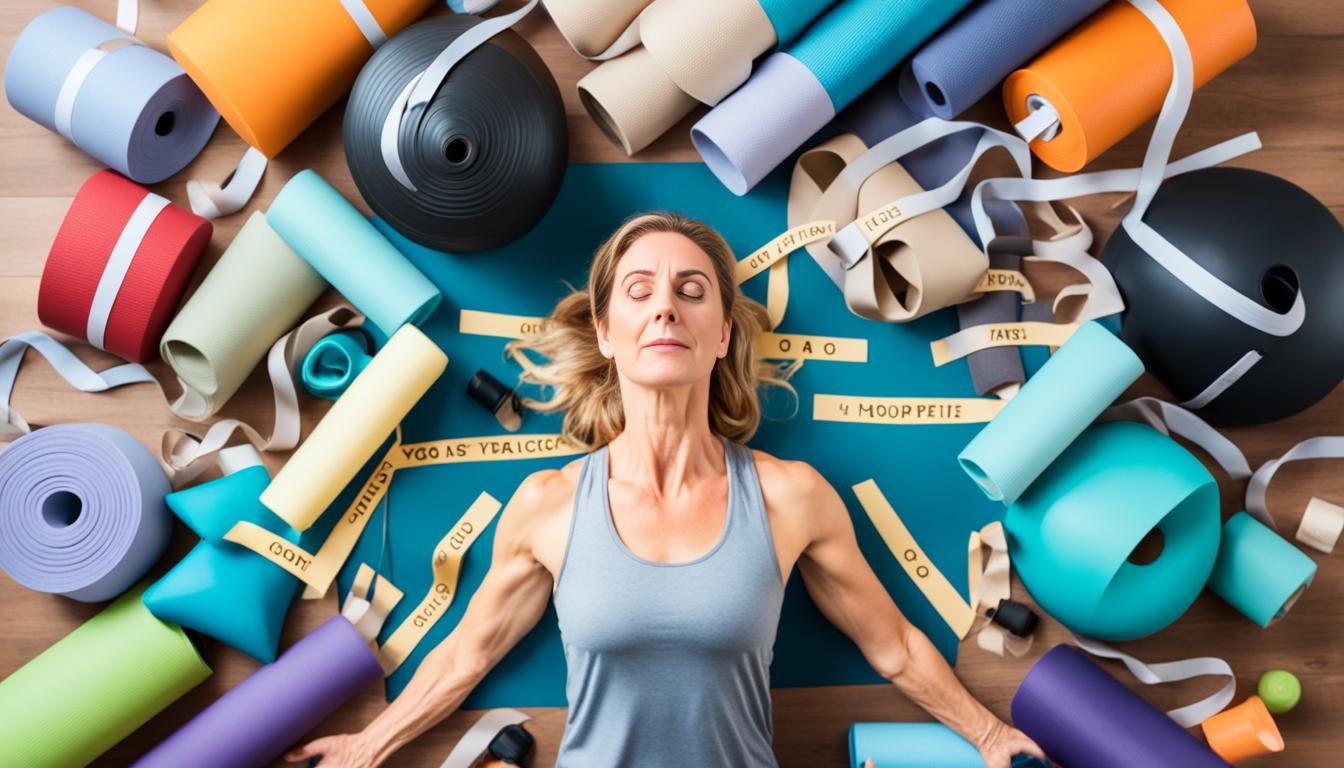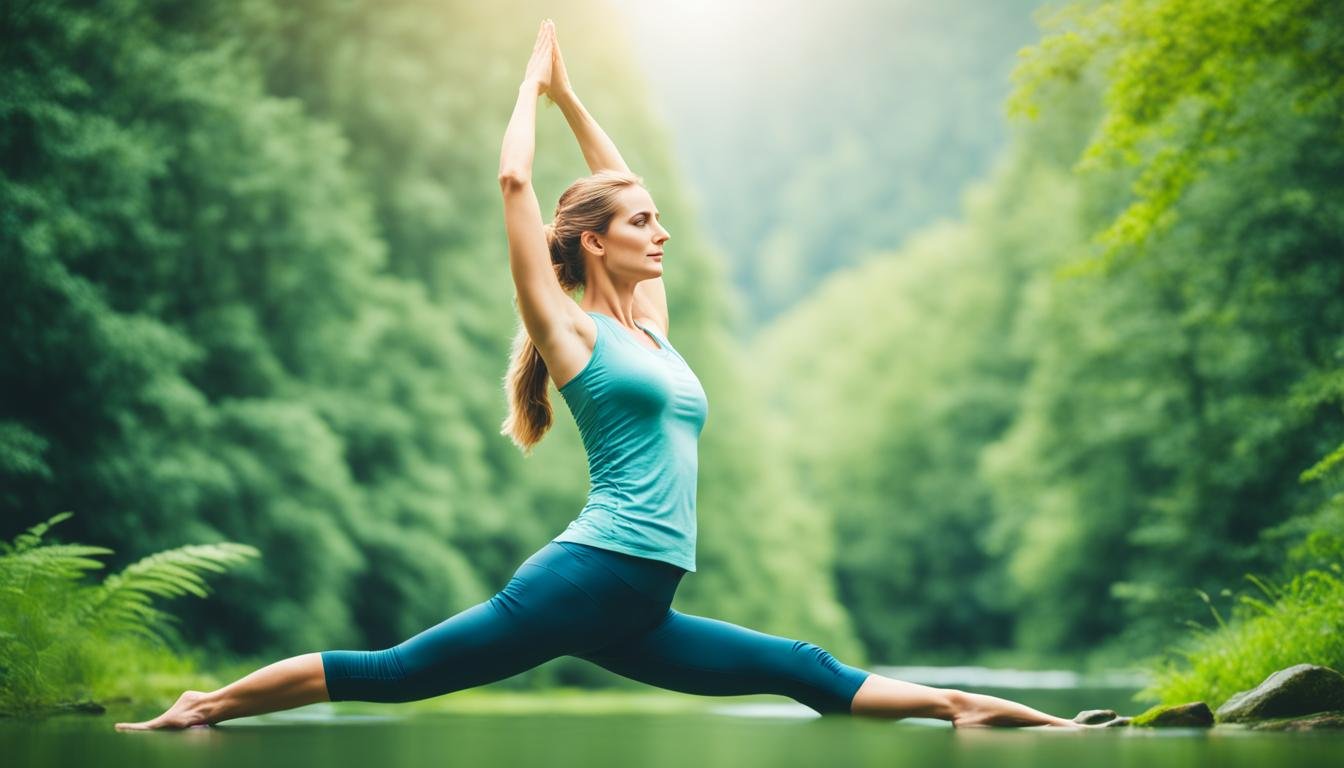Starting yoga can make your life happier and healthier. It’s more than just a type of workout. Yoga teaches us to live a certain way. It’s about accepting yourself, letting go of what you expect, and learning the heart of yoga.
Focusing on your breath and being okay with stillness are key when you’re just beginning yoga. You should learn some basic poses. And taking classes with skilled teachers can really guide you well.
- Yoga is a holistic practice that offers numerous benefits for beginners.
- Beginner yoga classes led by experienced instructors can provide a solid foundation for your practice.
- Paying attention to your breath and embracing stillness are vital components of beginner yoga.
- Learning basic yoga poses is essential to building a strong yoga practice.
- Starting your yoga journey at home or in a beginner class can help you incorporate yoga into your routine.
Takeaways>
The Benefits of Yoga for Beginners
Yoga is great for those starting out, bringing many benefits. It helps with stress, anxiety, and can lift the blues. Besides, it boosts your memory and gets you in better shape.
Yoga looks at wellness as a whole, touching both body and mind. Starting yoga gets you balance, flex, and strength. It also brings peace and awareness into your life.
Studies show yoga cuts stress and eases anxiety by working on breath and poses. It triggers your body to chill out, which feels pretty good.
“Yoga has been scientifically proven to reduce stress by regulating stress hormones in the body and enhancing the function of the parasympathetic nervous system.”
Yoga also helps beat the winter blues. It mixes movement, breath work, and meditation to lift your spirits. So, your emotions get a little more in check, and you generally feel better.
“Practicing yoga can release endorphins, promote a sense of well-being, and increase levels of serotonin and dopamine in the brain, which are neurotransmitters linked to mood regulation and happiness.”
On top of your better mood, yoga does wonders for your body, too. It makes you more limber, fixes your stance, and pumps up your muscles. Plus, it can help with long-lasting aches, keeps your heart healthy, and makes your immune system stronger.
For every beginner, there’s a type of yoga out there. Try ones like hatha, vinyasa, or restorative to see what clicks. Whether you’re solo or with a group, yoga fits your needs and brings joy to exercise.
Yoga for Stress Relief
Yoga is tops for cutting back on stress, especially for newbies. It teaches calming moves, breathing, and meditating which relaxes your body and mind. Regular yoga makes tackling stress easier, lifting your well-being.
Yoga for Anxiety and Depression
For those fighting anxiety and blues, yoga might be just what you need. It mixes poses, breath work, and mindfulness into a full treatment. This approach helps regulate mood and improves mental health.
Yoga for Overall Well-being
Yoga is a fantastic way for beginners to boost their health. It betters your body’s flex, strength, and posture. It also lifts your heart’s health and feels great mentally and emotionally.
Debunking Yoga Myths for Beginners
Yoga has a lot of myths that might make beginners hesitate. But we’re here to tackle these misconceptions head-on. Let’s clear the air on what yoga is really about.
Myth 1: Flexibility is required for yoga
Many think you have to be flexible to do yoga. This isn’t true. Yoga is about growing more flexible over time, not being a gymnast from the start. As you practice, you’ll see your body open up. It’s all about the journey you take.
Myth 2: Yoga is a religion
Yoga comes from ancient spiritual traditions, but that doesn’t make it a religion. It’s a practice that unites mind, body, and spirit. It welcomes anyone, no matter their belief system. So, you can do yoga no matter what you believe in.
Myth 3: Yoga requires a significant time commitment
Some think yoga eats up hours of their daily schedule. But you can benefit from just a short yoga practice. Whether it’s 10 minutes or an hour, doing yoga regularly helps your body and mind. Start small and see how it fits into your daily life.
Myth 4: Yoga is too complicated
Feeling overwhelmed by yoga’s complexity is normal for beginners. But keep in mind, yoga can be as simple as you like. There are styles and classes for all levels. An expert can guide you from the basics to more advanced poses. It’s all up to you and your goals.
We want to invite more people to try yoga by debunking these myths. No matter your shape, time, or experience, yoga is for you. So why not start your journey today?
Check out the table below for a quick summary of the debunked myths:
| Myth | Debunked |
|---|---|
| Flexibility is required for yoga | No, yoga improves flexibility over time |
| Yoga is a religion | No, yoga is a holistic practice |
| Yoga requires a significant time commitment | No, even short sessions can be beneficial |
| Yoga is too complicated | No, yoga can be tailored to individual needs |

Now that we’ve busted these myths, you can start yoga with confidence. It’s a journey towards understanding yourself and being well.
Essential Yoga Terms and Props for Beginners
If you’re new to yoga, it’s vital to learn basic terms and try using props. Knowing yoga terms helps you follow classes and talk to teachers easily. Props like blocks and straps make poses easier and more effective.
Yoga Terms for Beginners
Let’s learn some key yoga words:
- Asana: means the yoga poses you do.
- Ayurveda: is an old Indian approach that goes with yoga.
- Mantra: is a special word or sound for meditation.
- Mudra: are hand signs that focus your energy.
- Pranayama: are breathing exercises to control and grow your breath.
These words cover poses, life views, and breathing in yoga. Knowing them helps you connect more with yoga and learn.
Yoga Props for Beginners
Props are a big help in yoga, especially for newbies. Check out these props:
Prop Function Yoga Mat Makes a safe and soft spot for you to move and stay. Yoga Blocks Help you get the right pose and go deeper in stretches. Yoga Strap Makes you more flexible and helps with tough poses. Yoga Blanket Gives you a cozy spot for poses or more cushioning.
Props are perfect for staying safe and steady in yoga. They help avoid harm and keep your body in the right position. This way, you can slowly grow stronger and more flexible.
Knowing about yoga words and using props is a great start on your yoga path. They make your practice better, safer, and full of joy. So, learn the terms, try the props, and dive into the transforming journey of yoga.
Conclusion
Starting yoga is a great step for anyone wanting to feel better. It’s easy for beginners and is good for both body and mind. You will learn how to accept things, focus on your breath, and do simple poses.
You don’t need much to start, just some guidance from teachers and maybe a yoga mat. Yoga offers more than just fitness, it’s about being healthy all around. By staying committed and open to learning, you will find many new benefits.
So, go ahead and begin your yoga journey now for a happier you. You can start by following videos at home or joining a local class. Yoga will help you shine in mind, body, and soul. Step into yoga now and let health and joy in.
FAQ
What is yoga for beginners?
Where can I find beginner yoga classes?
Can I practice yoga at home as a beginner?
What are some easy yoga routines for beginners?
How can I find gentle yoga for starters?
Source Links
- https://yogainternational.com/article/view/beginner-yoga-journey/
- https://jadeyoga.com/blogs/news/yoga-for-beginners-7-tips-for-starting-yoga-for-the-first-time
- https://play.google.com/store/apps/details?id=net.workoutinc.yoga.beginners.free.workouts.studio&hl=en_US








GIPHY App Key not set. Please check settings